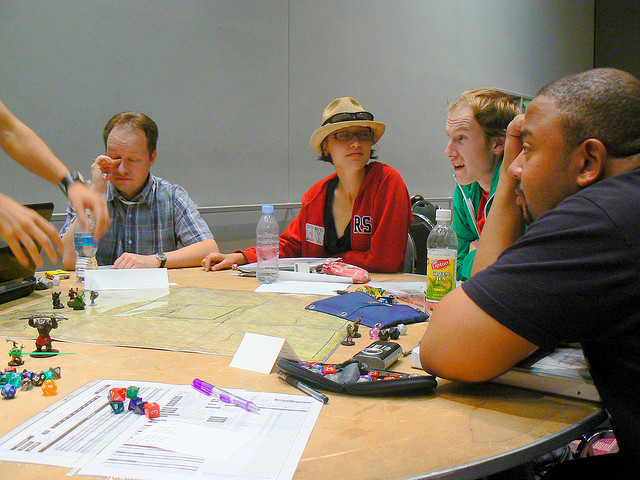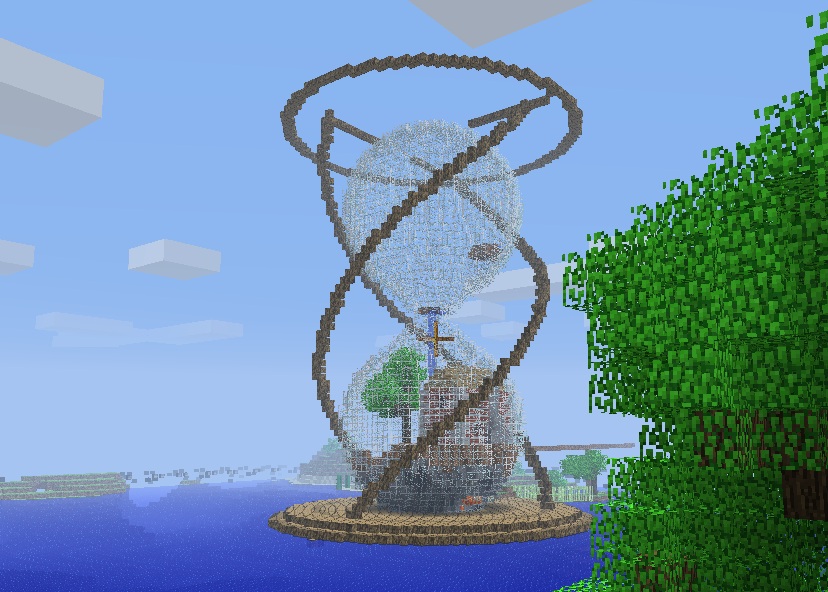Embracing Unintended Game Design
2011, July 29th 9:51 AMI've done a lot of pen-and-paper roleplaying over the years.
I started with Dungeons and Dragons Second Edition, or, more exactly, I started with a horrifyingly botched interpretation of the rules, filtered through my middle-schooler mind. I vaguely recall rolling a d20 for stats and I'm pretty sure we had no idea what spell slots were. Since then I've played three major editions of D&D, three major editions of Shadowrun, had a brief and unfortunate foray into the world of Rifts and a briefer and far more unfortunate foray into a hand-rolled Xanth roleplaying system, and, to be quite honest, spent far more time thinking about roleplaying than I actually did roleplaying.
Anyone who's hung around roleplayers has heard a bunch of the same horror stories. I played this game, the whole damn thing was on rails, we had to read the GM's mind. The GM was a control freak and everything had to happen his way. It was a great game, except that the story always followed the GM's plan, no matter what. If you've played games, you know this GM. You've probably met him, you've probably played in his games, you've probably spent a frustrating hour coming up with clever plans and having them shot down unilaterally.
I used to be that GM. I'll admit it. My Xanth games were the worst example – little more than a thinly veiled excuse for running through the plot of the books, including skipping entire chapters when I couldn't figure out how to shoehorn the player through the *cough* scintillating plotline. My Rifts game was better, albeit only slightly. I had one of my best moments in that game, when the players managed to spy on the enemy encampment and, as what was intended to be a throwaway bit of scenery, I mentioned a huge dragon sleeping off in the corner of the camp. This kicked off about four hours of violent explosive shenanigans that left the camp in ruins. Followed immediately by one of my worst moments when I Deus Ex Machina'ed the entire thing away so I could give a speech. Seriously, Zorba. What the hell were you thinking.

The nice thing about RPGs is that the GM is sitting there, and the GM is a human. So when the players say "fuck that, we're not going into that cave to rescue the Mayor's daughter, that's way too dangerous" the GM can come up with a solution. Maybe they get driven inside. Maybe the mayor offers a bigger reward. Or maybe they just walk away and in the next town they have to deal with people telling stories about the adventurers that ran from a fight. You can improvise, and a good GM will improvise.
You can't really do that with games. When you release a game, that's the game, that's what the player's going to play. If the player doesn't want to go into that cave, well, tough cookies, the plot isn't going to continue until you do.
And that's not really a bad thing. We've only got so much money we can pour into game development. We can't make a game where the player can go into the cave and kill goblins, or the player can go abandon his adventuring lifestyle and become a farmer, or the player can hire mercenaries to go in and clean out the cave and then turn the cave structure into an amusement park serving Goblinburgers and Gnollshakes. We can't make all that stuff fun, we just don't have the developer time. And, for many years, that's where the limit was: you implement a game, the user plays the game, the user beats the game, hooray.
Then we invented multiplayer games and all hell broke loose.
It turns out that human social structures are unbelievably complicated. It turns out that human motivations are deep and multilayered. It turns out that when you have the goal "kill a bunch of monsters, you are a better player if you kill more monsters", and you expect people to go kill monsters independently, some bright person is going to realize that, hey, you can pay people to help him kill monsters, and then he's a better player because he's killing more monsters!
The industry response to this is swift and predictable: They're playing the game wrong. Put them back in their box and tell them to play the game right this time.
And it doesn't work, because we seal up one exit to the box, and then it turns out there's another exit, and the whole thing happens again.
When World of Warcraft: Wrath of the Lich King was released, a player named Athene had a clever strategy to reach level 80 before anyone else. Despite asking the GMs for permission, he got banned for it because he wasn't playing the game right. When World of Warcraft: Cataclysm was released, he tried again, this time succeeding. Wanna guess what will happen when they raise the cap to 90? I'm willing to bet Athene will be there powerleveling to 90.

When someone finds a hole in the rules, our first reaction as game developers isn't "whoa, awesome, they found a new way to play!", it's "We have to stop them, because this is our game and you're not allowed to do that." Which we can do, because it's our world they're playing in, we can just push a button and make them stop doing whatever they're doing. Back on the beaten path, boy. That's where you're meant to be. And the game goes on, and we rest, satisfied that we're the master of our own domain, and that the players are playing the game correctly.
Which goes all to hell when we do something outside our domain.
Example One: Chain World. Jason Rohrer bought a Flash drive and put a copy of Minecraft on it. He gave it to someone, with a single set of rules: Do not copy it. Play the game once, building and creating whatever you wish. When your character dies, pass it on to someone else. These are the rules and these are the only rules.
The rules were broken instantly. Jia Ji was the first person who got it, and he put it on eBay and made the buyer promise to send it to specific people next. The community was outraged. He's playing the game wrong. Then broken again, perhaps – the game may have been destroyed, the game may have moved on, but nobody's saying. The rules lasted exactly as long as it took Jason Rohrer to describe them.
Example Two: Eric Zimmerman's coins. At the most recent GDC, there was a talk, and during that talk, coins were handed out. At the end of the talk, the person with the most coins got to give their own talk. Those were the rules, and the rules were defined by Eric Zimmerman.
Ryan Creighton used social engineering to acquire the entire bag of coins, and the watchers were outraged. He's playing the game wrong. So Eric broke his own rules, and gave the extra talk to someone he felt was more deserving. Then Eric broke his own rules again, and let Ryan talk for ten words. Ryan, of course, broke that rule, and gave a substantially longer talk than ten words.
You make a game. You offer to let someone play the game. They play a different game than you intended. Then you get angry that they're playing the wrong game.
This is a mistake.
When Athene plays World of Warcraft, he's not playing Blizzard's World of Warcraft. He's playing Athene's World of Warcraft. It's a similar game, with some of the same fundamental rules, but with different guidelines. In Blizzard's World of Warcraft, you don't join and drop groups to maximize the amount of experience you gain. In Athene's World of Warcraft, you do. And, critically, these are the same games. Neither game has a rule that says you cannot, or that you must, but in Athene's game, which Athene plays to accomplish Athene's goals, you do.
Jason Rohrer bought a Flash drive to make Jason Rohrer's Chain World. Then he gave it to Jia Ji and Jia Ji turned it into Jia Ji's Chain World. Jason Rohrer invented Jason Rohrer's rules, and Jia Ji invented Jia Ji's rules.
Eric Zimmerman invented a game involving coins, and he made Eric Zimmerman's Coin Game. Then he gave it to a room full of people, and each person invented their own coin game. Many of these were equivalent to Eric Zimmerman's game, but Ryan Creighton's Coin Game was different. You see, Eric Zimmerman's coin game was about collecting coins, and Ryan Creighton's coin game was about collecting coins in a slightly different manner that Eric Zimmerman hadn't thought of.
Jia Ji wasn't following Jason Rohrer's rules, and Ryan Creighton wasn't following Eric Zimmerman's rules. But Jason and Eric had let their games escape, and someone else had found a new way to play it. When they realized that, they tried to bring the game back. No. That's my game. You can't play it like that. You're not playing the game right.
But it wasn't Jason Rohrer's game anymore, and it wasn't Eric Zimmerman's game anymore.

When we make a game, we give it life. We create the rules of its existence. But then we send it out into the world, and other people take the game and change the rules and make it their game. Traditionally, this happened in people's homes, with house rules and tweaks and simple unintended misunderstandings, with people finding a new way to play the game or inventing a strategy that we never considered. But today we make huge multiplayer games. When we let the game go out, we tell people they're allowed to play it, but then we punish them for not following our view of how it should be played. We're telling them to play, then forcing them to follow.
I think this is a mistake. More accurately: I think reflexively doing this is a mistake. With multiplayer games there are certainly situations where someone finds it fun to destroy other people's enjoyment of the game, and that should be taken care of, ideally swiftly. But in a situation where one person has invented a new way to play the game that does not harm others, what's the issue? In a singleplayer game, or a sandbox game, or even a multiplayer game, why, whenever we are confronted with someone who's playing our game in a different manner, is our first instinct to stop them?
We cannot and should not hover over people's shoulders, telling them how to play the game. We should develop games that people want to play, and if they discover a way to play the game that we were not aware of? Maybe that's for the best. Maybe we can learn from that. Maybe we can say, hey, you are not playing the game I invented, but that's cool, and your game looks like fun, how about if I change my game to behave more like your game.
Maybe we need to learn to let go of our toys and let others play with them for a while.
Maybe we'll learn about some new games.

